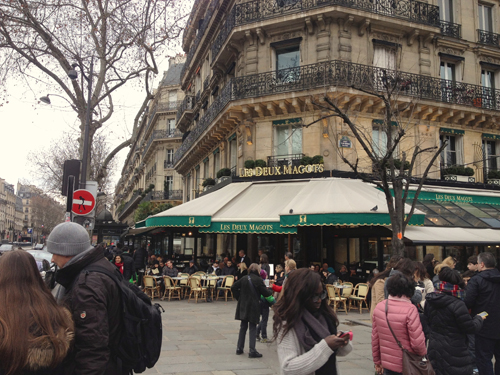
Your complimentary articles
You’ve read three of your four complimentary articles for this month.
You can read four articles free per month. To have complete access to the thousands of philosophy articles on this site, please
Editorial
You Always Have a Choice!
Given the current fashion for referendums Rick Lewis has decided to offer you a choice of editorials. Pick wisely!
Despairing Editorial
Welcome to Philosophy Now’s new issue on Existentialism. We have to do an Existentialism-themed issue every couple of years because you people apparently never get tired of those gloomy, angst-ridden, black-polo-necked, coffee-swilling Parisian poseurs. I hope you realise how tough it is for us, having to produce features on Sisyphus and the meaninglessness of life over and over again. It seems like we are trapped in an Eternal Return of the same, and yet at the same time we are reproached and taunted at every moment by the knowledge that we are actually completely and inescapably free – free to turn Philosophy Now into a golfing magazine, free to paint the editorial office bright purple, free even to end it all (for example by selling the magazine to the Vasto Publishing Corporation and running off to Brazil with the proceeds, if we can get a really cheap flight). So why do we not do so? Our failure to constantly weigh these options clearly shows we are in Bad Faith. Why, oh why, do we allow ourselves to be trapped in a little room with Camus, Sartre and Simone de Beauvoir until finally it feels like an eternity in hell? And why do we assume that you will buy this issue, just because you all did so the previous times we produced an Existentialism-themed issue? Perhaps us putting the issue together at all is a Leap of Faith?
We’ve now been publishing this magazine for twenty five years. Twenty five! Though to be honest it feels a lot longer. Bah humbug.
[The Editor has gone for a little lie down. He thought you might like this photo of Sartre and de Beauvoir’s favourite café, Les Deux Magots in Saint-Germain-des-Prés, Paris.]

Photo by Rick Lewis, Paris, 2015. In memory of Marilu.
Hopeful Editorial
Welcome to Philosophy Now’s new issue on Existentialism, one of the most important and fascinating philosophical movements of modern times. Its popularity never dims, because its concerns are not merely of interest to scholars: it grapples with some of the biggest questions we all face in our own lives – questions of meaning, of freedom, of responsibility, of personal identity and authenticity, of religious belief, of mortality, of the apparent absurdity of life.
These questions also, of course, run through much of culture including art, music, theatre, cinema and literature. So it isn’t surprising that people use Existentialist ideas to understand works of art, or that some of the key philosophers of Existentialism were novelists or playwrights as well.
So what is this philosophy? What are its central assumptions and its central claims? It starts with the assumption that we are thrown into a universe that doesn’t care about us, and that we have no pre-determined purpose in being here and no pre-determined essence of who we are. So our existence comes first, and who we then become through our freely-chosen actions is up to us. Or, in the popular Existentialist slogan, “existence preceeds essence”. To find out more, read Stuart Greenstreet’s introduction. This issue also contains a selection of articles about Existentialist thinkers including Søren Kierkegaard, Jean-Paul Sartre, Simone de Beauvoir and their sometime friend Albert ‘I’m-Not-Really-An-Existentialist’ Camus. It applies their ideas to life and art including the treatment of depression and understanding punk rock music. We even take a look at de Beauvoir’s Existentialist ethics. So enjoy the articles in this issue but remember that they barely scratch the surface of this subject.
Existentialism is a very rich philosophy; let’s take just one of its concepts as an example: Bad Faith. According to Sartre, we can be in Bad Faith in two different ways. One kind of Bad Faith is when we refuse to face up to particular facts about our lives (“Yes, he beats me up, but I know that deep down he loves me.”). A second kind is when we refuse to recognize our own freedom (“I can’t join the circus because I’m head waiter and this café needs me.”). Sartre believes that we always have choices, even if the various alternatives open to us may not always be very appealing. This one concept of Bad Faith alone, carefully applied, offers so much potential for understanding and indeed improving our lives; and that’s before we even get started on concepts like authenticity and absurdity. If you think that philosophy should have the potential to change the way people live, then Existentialism is one school of thought you really have to study!









